Notes from (Boston) Underground Part I: BUFF’s “The Dunwich Horrors” Local Shorts Program
By Ezra Haber Glenn
In order to appreciate this smorgasbord of schlock by independent filmmakers from around New England, it’s best to understand the program in context.
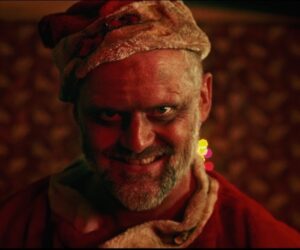
A scene from Christmas Wrapping.
The Friday evening crowd-pleaser session of the Boston Underground Film Festival, The Dunwich Horrors, featured 11 horror shorts by independent filmmakers from around New England. (The program title is a reference to a short story by Providence native and hometown hero H.P. Lovecraft, who dedicated his career to the literary aspirations of pulp fiction and horror and inspired much of the arthouse camp that has blossomed from these rich eldritch roots.) The Brattle Theatre was packed to the back row of the balcony with an appreciative audience of filmmakers and families, festival organizers, local horror fans, and the occasional open-minded reviewer scouting for new talent.
To this last point, in order to appreciate this smorgasbord of schlock, it’s best to understand the program in context. I say this not to downgrade standards or to dismiss the importance of local festivals, but rather to appreciate the offerings for what they are, how they were made, and what they are trying to accomplish.
For starters, shorts are fundamentally different from features: they’re shorter. With no more than 20 minutes of screen time — and often significantly less — it’s impossible to develop much of a plot arc, so the films typically turn on either a funny premise or an unexpected reveal, or (for the more ambitious) serve as a “proof of concept” for what could become a longer feature, given the time and budget. In addition, these are all independent films, shot on a shoestring. The best of them put their limited funds and creative juices into the stories and concepts, the strengths of a couple central actors, and a coherent vision driving the camera. Limitations include shooting on a single location with everyday materials and minimal effects. Scripts must be efficiently pared down to remove secondary characters, extras, costume changes, specialized props, and the like.
But, when these underground shorts focus on fundamentals and lean into the format, they can deliver some very exciting festival-going experiences. (And as an added bonus, similar to attending AAA ball games, the fan energy is high — there’s always the possibility you’ll see a star in the making.). The offerings this year ran the gamut from punchy to poetic, effectively mapping the terrain that shorts can comfortably cover: kudos to director of programming Nicole McControversy and the programming team for delivering such a thoughtful, balanced lineup.
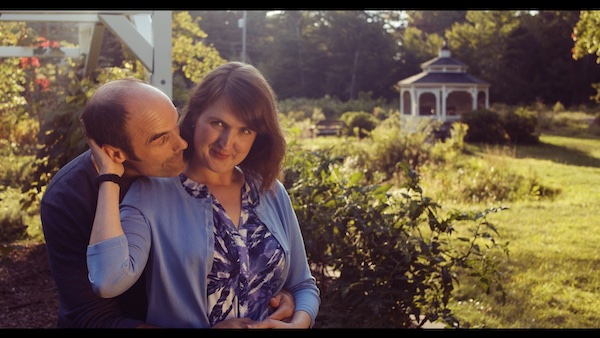
A scene from The Old God!
The starting fare was light but fun: premise-driven vehicles closer to SNL skits than short films. Samuel Carlson’s The Old God! offered up a campy fake commercial for the elder religions, a nice shout-out to the festival’s Lovecraftian roots. Miriam Olken’s Petunia gave new meaning to the term “animal sacrifice,” as a couple of prospective home-buyers (Lorraine Kanyike and Christian Ruiz) ham it up as they underline the importance of “let the buyer beware.” (Monty Python fans will appreciate the reference to the most bonkers gag from 1975’s Holy Grail.) And a trio of newbie cultists fumble their way through a conjuring spell with humorous results in Erica Stockwell-Alpert’s Dead Language.
Director Mike Canale’s Christmas Wrapping and Amber Chilton’s Pray (starring Beka Barski, accompanied by some excellent composition work by Nate Prime) round out the humor section, with unsuspecting victims meeting unfortunate ends following amusing — if predictable — setups.
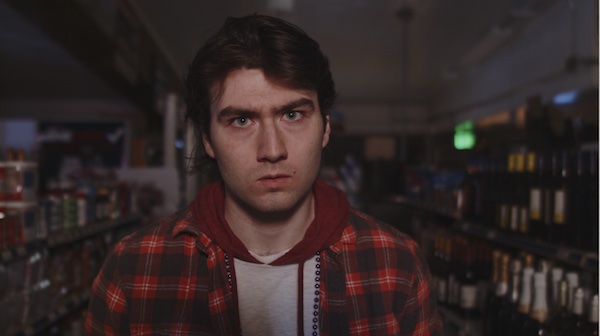
A scene from Rest Stop.
At the heart of the order, two of the darker offerings embrace the “B” of “BUFF,” playing to the local aspects of the festival. Bostonians love to see their hometown on screen, and the more obscure or offbeat the location the better. Shot entirely on the North Scituate Commuter Rail platform, Andrew Connelly’s Last Train channels the sad loneliness of waiting for an out-of-the-way late night train. Perhaps even faceless terror might be a welcome distraction. In a similar vein (including — strangely — similar faceless terror), Eric Bielakiewicz’s Rest Stop captures the eerie neon aura of a classic New England “packie,” as a late-night beer run past Leominster and Fitchburg leads to the ultimate buzzkill in a deathly quiet New Hampshire border town.
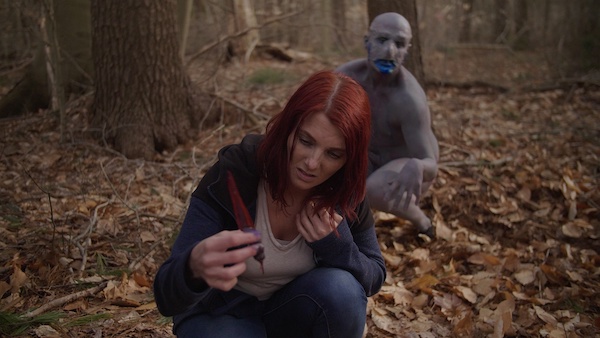
A scene from Reverberance.
Written and directed by Alex DiVincenzo and TJ Frizzi, Reverberance stars Sheri Lee and a voiceless-but-scene-squealing Brian Bouyea. It provided a brief interlude in the darkness, changing the mood to a colorful and lighthearted daylight nightmare, with excellent use of sound throughout as a tortured bird-man monster stalks a suburbanite in the nearby woods.
In terms of overall quality and production value, the curators saved the best for last, with the final three shorts delivering the slower-burn visual style and decompressed narratives that characterize contemporary art-house/indie horror films, such as The Witch or A Field in England. The approach is heavier on the psychological terror and the slow drumbeat of a waking-dream fear-state, lighter on all the fake blood, chainsaws, and silicone monster masks. Some might question whether this artistic direction takes you up out of the underground. But this would be a mistake: once we start making rules about what counts as “underground” I worry we’ve lost the thread entirely…
Penny, directed by Rachel Thomas-Medwid, delves into the spaces between memories and reality to conjure a misty, moody, slow-reveal of a tale blending dreamlike past and present trauma, where one expects there is more going on than meets the eye. The most visually ambitious work in the program took the form of Nathan Sellers’s The Watcher and the Children of Enoch, a rosy-hued and retro-framed nostalgic vigil. The plot: the last surviving member of an apocalyptic cult (Sandrine Morin) calmly prepares her home and family to await the end of days.
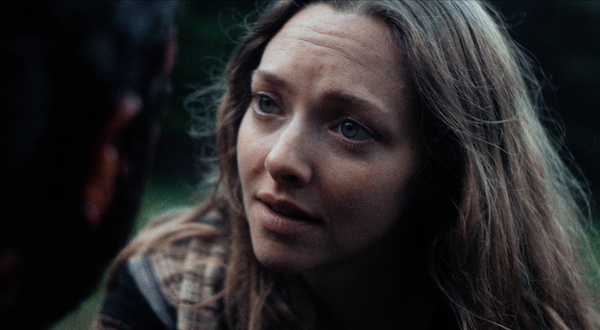
A scene from Skin & Bone.
Closing out the night for a strong finish, Eli Powers’s Skin & Bone spins an unsettling story around a familiar premise. A wandering stranger arrives at an isolated farm looking for work, but rather than shelter he finds himself the unwitting victim of dark forces that, drawing on almost hypnotic suggestion, compel him to become the tool of his own undoing. Thomas Sadoski delivers apt soulful brooding as the strong-silent drifter, while Amanda Seyfried plays the captivating farmer with a delightfully eerie, almost vampy, lilting innocence. (The two leads are married in real life, adding a deeper level to the tortured dynamic.)
Although nothing beats the electric energy of a festival — especially a local one with the heat of the underground and the shared chill of a packed-house horror crowd — you can still check out many of these films from the safety and comfort of your own home or subway car via YouTube or Vimeo. (And if you like what you see, most of the filmmakers have links beyond these teasing shorts — just click through for more excellent bite-sized filmlets.)
Nicole Veneto’s review of films in this year’s BUFF, Part 1
Ezra Haber Glenn is a Lecturer in MIT’s Department of Urban Studies & Planning, where he teaches a special subject on “The City in Film.” His essays, criticism, and reviews have been published in the Arts Fuse, CityLab, the Journal of the American Planning Association, Bright Lights Film Journal, WBUR’s ARTery, Experience Magazine, the New York Observer, and Next City. He is the regular film reviewer for Planning magazine, and member of the Boston Society of Film Critics. Follow him on https://www.urbanfilm.org and https://twitter.com/UrbanFilmOrg.
Tagged: Alex DiVincenzo, Amanda Seyfried, Amber Chilton, Boston Underground Film Festival, Brattle Theatre, Christmas Wrapping, Dead Language, Eli Powers, Eric Bielakiewicz, Erica Stockwell-Alpert, Ezra Haber Glenn, Horror shorts, Mike Canale, Miriam Olken, Nathan Sellers, New England Film Makers, Penny, Petunia, Rachel Thomas-Medwid, Reverberance, Samuel Carlson, The Dunwich Horrors, The Old God!, The Watcher and The Children of Enoch, Thomas Sadoski, skin & bone
